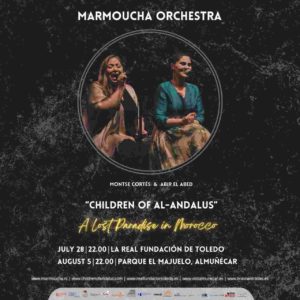5 augustus 2022
Deur open: 21:00 uur
PARQUE EL MAJUELO, ALMUÑÉCAR (GRANADA), Avenida Europa, 28 , Almuñécar (Granada),
Entree: €12,-
Ga naar het Facebookevent
Meer speeldata:
Eigen productiesMusic from the Lost Paradise in Morocco
Many Moroccans of Andalusian descent consider Al-Andalus as the lost paradise. Both Jews and Muslims were expelled from Al-Andalus, the Arabic name for the Iberian Peninsula, starting from 1492. They found a safe haven in Morocco, where they kept their Andalusian culture and traditions alive. Some families still preserve the centuries-old keys to their houses in Granada. Come and listen to a beautiful and unifying musical encounter between the past and the present, between Jewish and Islamic, between classical and modern.
The Children of Al-Andalus…
… are the Moroccan descendants of Andalusian Muslims and Jews. Fleeing from the Spanish Inquisition, they left the Iberian Peninsula starting from 1492. Many of these refugees built a new life in Morocco. In Morocco, the Andalusian Jews and Muslims felt at home together for centuries. They shared memories of their homeland and their past, preserving their rich Andalusian traditions, culture, and identity. Music played a significant role in their lives, and it still reflects their deep connection.
A Melting Pot of Musical Cultures
For centuries, Al-Andalus was a melting pot of musical cultures. It began with Ziryâb, an ud player from Baghdad who introduced the first Arabic sounds to the court of Córdoba in 822. By the year 1000, Córdoba had become the largest city in the world and a cultural, artistic, and intellectual center. In the 12th century, Ibn Bajja emerged, combining Ziryâb’s Arabic musical heritage with local Romanesque music styles. This eventually gave rise to various music genres, from classical Andalusian-Moroccan songs (noubat) to flamenco.
The Story of Flight in Music
The music performance consists of several compositions, each telling a part of the story of the Andalusian refugees. From the Arab and Berber conquest of the Iberian Peninsula in 711 and the golden age of Córdoba to the surrender of Granada in 1492 and the flight to Morocco. In Children of Al-Andalus, all forms of Andalusian music find their place, from medieval Andalusian nouba to modern Moroccan compositions, from taqsim to different types of flamenco. Often, the music styles engage in exciting crossovers, with two music styles or instruments from different genres engaging in dialogue.
Hosts The evening will be hosted by Rick Leeuwestein and Hicham Ghalbane.
Musicians
The works will be performed by a group of professional musicians:
Abir El Abed – vocals
Montse Cortés – vocals
Mohamed Ahaddaf – oud
Avishai Darash – piano
Emad Ghajjou – darbuka
Udo Demandt – percussion instruments
Arin Keshishi – bass guitar
Eduardo Cortés Santiago – flamenco guitar
André Felipe Lima – violin
Daniel Lee – violin
Irma Haverkamp – viola
Lucas Stam – cello
Maria Cristina González – flute
Maripepa Contreras – oboe
The works will be performed by the musicians of the Marmoucha Orchestra, Spanish flamenco singer Montse Cortés, flamenco guitarist Eduardo Cortés, and Moroccan singer Abir El Abed.
Montse Cortés is an icon of flamenco. She has performed with artists such as Sara Baras and Paco de Lucía and was nominated for the Latin Grammy Awards.
Abir El Abed is a young singer from Morocco and one of the few artists who carries the Arabic-Andalusian musical heritage. She enriches the concert with her colorful, powerful, and yet gentle voice.
Eduardo Cortés (a cousin of Montse Cortés) was born in Barcelona in 1980. He has worked for flamenco companies like Antonio Canales, Sara Baras, and María Pagés, and has accompanied dancers such as Farruquito, Pepe Torres, Pastora Galván, Israel Galván, Manolete, El Toleo, Javier Latorre, Eva La Yerbabuena, Belén Maya, Belén Fernández, Manuel Linán, and Marco Flores.
The Marmoucha Orchestra consists of passionate musicians with a love for music and the diversity of musical languages, styles, and traditions from North Africa, the Middle East, and the Mediterranean. The Marmoucha Orchestra performs in all productions of Marmoucha, bringing together musicians, artists, and audiences and bridging Eastern and Western music. It serves as a meeting place for anyone interested in Arab culture and world music.
Book ‘Children of Al-Andalus’
The book Children of Al-Andalus was created by Rick Leeuwestein and Hicham Ghalbane.
Order the book via: https://www.childrenofandalus.com/shop
Special thanks to all the funds that made this project possible: FPK, AFK, Prins Bernhard Cultuurfonds, Fonds 21, Hendrik Muller Fonds, Zabawas, BNG Cultuurfonds, Van den Berch van Heemstede Stichting, and M.A.O.C. Gravin van Bylandt Stichting.
https://www.youtube.com/watch?v=7g7N1odfodk
Montse Cortés – zang
Mohamed Ahaddaf – ûd
Avishai Darash – piano
Emad Ghajjou – darbuka
Udo Demandt – slagwerkinstrumenten
Arin Keshishi – Basgitaar
Eduardo Cortés Santiago – flamencogitaar
André Felipe Lima – violin
Irma Haverkamp – altviool
Lucas Stam- chello
Maria Cristina González – fluit
Maripepa Contreras – hobo
Eduardo Cortés (een neef van Montse Cortés) werd geboren in Barcelona in 1980. Hij werkte voor de flamencogezelschappen van Antonio Canales, Sara Baras en María Pagés en begeleidde dansers als Farruquito, Pepe Torres, Pastora Galván, Israel Galván, Manolete, El Toleo, Javier Latorre, Eva La Yerbabuena, Belén Maya, Belén Fernández, Manuel Linán of Marco Flores.

